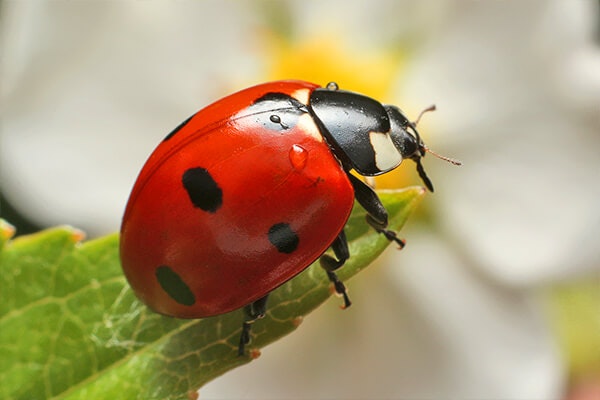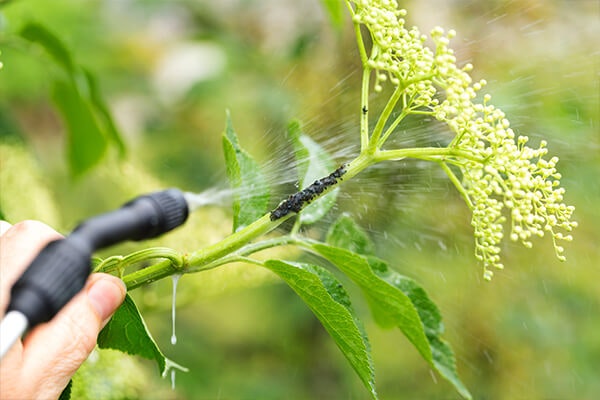 Back to the Be Inspired Blog
Back to the Be Inspired Blog

Eco-Friendly Tips for Pest Control
Nothing is worse than giving your garden your all, only to find that rabbits have made a buffet of your veggie garden, or aphids have destroyed your favorite shrub. Not only are pests nuisances, but they're also a danger to your garden. Your first instinct might be to jump to pesticides right away—we get it, they're unpleasant—but there are many effective, more natural methods to consider first! Environmentally-friendly pest control methods will help to eliminate or prevent pest populations while minimizing risks for you, your family, and your plants.
Environmentally-Friendly Animal Control Tips
While a family of deer or a passing raccoon might be welcome visitors to your backyard, they’re definitely not guests you want to overstay their welcome. Here are some natural ways to protect your garden from common animals:

Create Physical Barriers: The easiest way to prevent animals, such as deer, rabbits, gophers, moles, and rodents, is to block them from entering your landscape in the first place. Fencing in your garden or building barriers around problem areas will help to keep these guys out. Remember to build barriers deep into the ground to prevent our local diggers. Greenhouses are another excellent option for protecting fruit and veggies.

Eliminate Food Sources: Sources of food are the biggest culprit for attracting animals to your landscape. Always ensure compost piles and garbage cans are properly covered, and try to contain birdseed to the feeders as much as you can. This is especially important for deterring squirrels, who can easily climb a fence. If they can’t find anything to eat, they’ll move along in no time.
Set Up Traps: If prevention techniques aren’t working, try using live traps to catch animals and rodents instead. That way, they can be safely released elsewhere, without harm. If you’re more worried about the safety if your garden than California’s mouse or rat population, we don’t blame you for using regular traps for these rodents.
Spray Pest Repellent: Pest repellants smell and/or taste bad to animals. Similar to how you might spray odor repellant on your wooden railings or dining room chairs to deter your puppy from chewing on them, these repellants can be sprayed on vulnerable plants. They won't cause harm; they just train animals to stay away!
Environmentally-Friendly Pest Control Methods
Unfortunately, fences and traps aren't going to work well for your much smaller, often more destructive pests. If left unnoticed, insects can quickly colonize to take over entire plants and even entire gardens in no time. Luckily, there are plenty of ways to control insects before pesticides become necessary:

Introduce Beneficial Insects: The first thing to remember is that not all insects are pests. Many work to pollinate your flowers, aerate the soil, and support a healthy ecosystem. Some bugs are even natural predators of your less-than-ideal insects. For example, ladybugs prey on aphids and whiteflies, predatory mites take out spider mites, and spiders, as creepy as they are, are great for controlling aphids, roaches, mosquitoes, and fruit flies.
Plant Companion Plants: Just like us, bugs have their favorite flowers— and they have their least favorites, too. When choosing garden plants, consider those that attract beneficial insects, as well as those that deter pests. For example, marigolds and chrysanthemums are huge insect deterrents. Many herbs, like basil and coriander, are also great for repelling insects like aphids, mites, and flies. Crops, like tomato and asparagus, can often be paired together as they deter each other’s common culprits. Overall, including a variety of different plants in your landscape design will encourage a healthy balance of bugs.

Use Organic Pesticides: While eco-friendly methods can prevent pest problems, they may not always be as effective in eliminating an existing issue. If you must use products to control infestations, look for organic, chemical-free choices first. Something as simple as soapy water can kill small, soft-bodied insects, like spider mites, aphids, and mealybugs. Horticultural oils are another great option, as they control bugs without damaging plants or affecting new growth. Just remember, when using any pesticide, organic or not, it won't only target the problem pest, and it will almost certainly affect beneficial bugs, too.
Eco-friendly pest control is just as effective as less natural methods, with the added benefit that your plants won’t suffer any more than they already have. They’re also much less irritating for members of your family who have allergies or asthma. Find comfort in knowing that your yard is a safe, organic, chemical-free space to enjoy.
Need advice? Our doors are open! Drop-in and chat with our SummerWinds staff about your unique pest control needs.

